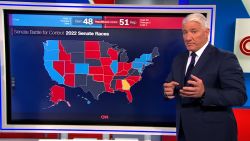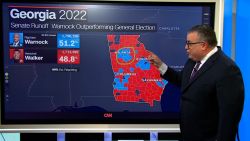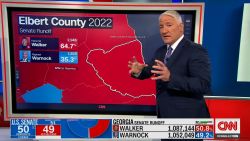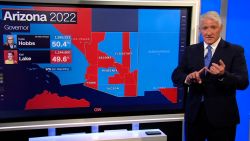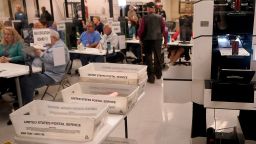Control of the US Senate could hinge on Nevada and Arizona, two states where GOP victories could elevate some of the most prominent election deniers in the country even after other nominees who had amplified former President Donald Trump’s falsehoods about the 2020 election were rejected by voters in Tuesday’s midterm elections.
Those two western states – perpetual battlegrounds in presidential years – were still too early to call as of early Thursday morning, while a third Democratic-held seat, Georgia, will advance to a December runoff, CNN projects. Republicans need to pick off two Democratic seats to win the majority. As ballots continue to be counted across the country, Republicans appear to be slowly inching toward the 218 seats that would deliver them a House majority, albeit one that’s much narrower than they’d hoped.
The struggle for the Senate, however, is still full of unknowns – including whether it will all come down once again to Georgia after the Peach State delivered Democrats the majority in 2021 with victories in twin runoffs. It’s Nevada and Arizona that will determine how pivotal Georgia becomes.
Arizona Democratic Sen. Mark Kelly was maintaining an edge over Republican Blake Masters as of early Thursday morning, while Nevada Democratic Sen. Catherine Cortez Masto was trailing Republican Adam Laxalt. CNN had estimated late Wednesday that about 600,000 votes remained to be counted across the Grand Canyon State and about 160,000 votes remained to be counted in Nevada.
Laxalt, Nevada’s former attorney general, was a co-chairman of Trump’s 2020 presidential campaign in the state and filed lawsuits attempting to overturn Nevada’s results in that election, which he said was “rigged.” Cortez Masto had argued that the lies and election conspiracies theories embraced by Trump and allies like Laxalt led to the attack on the US Capitol on January 6, 2021.
Masters, a venture capitalist and first-time candidate, released a campaign video as he was competing for the GOP nomination in which he said he believed Trump had won the 2020 election. Masters, like Laxalt, clinched Trump’s endorsement.
After winning the Arizona Senate primary, Masters briefly appeared to back away from some of that extreme rhetoric – scrubbing his website, for example, of language that included the false claim that the election was stolen. In a debate with Kelly, he also conceded that he had not seen evidence of fraud that would have changed the outcome of the election. But the Republican nominee seemed to reverse course after receiving a phone call from Trump urging him to “go stronger” on election denialism, a conversation that was captured in a Fox documentary.
Election deniers up and down the ticket
In addition to Laxalt and Masters, Arizona GOP gubernatorial nominee Kari Lake and the Republican nominees for secretary of state in both states – Arizona state Rep. Mark Finchem and former Nevada state Assemblyman Jim Marchant – have been some of the highest profile promoters of Trump’s falsehoods about the 2020 presidential election.
Lake and Democrat Katie Hobbs, the Arizona secretary of state who rebuffed Republican efforts to overturn the 2020 election in the state, were nearly deadlocked as of early Thursday. Finchem was trailing Democrat Adrian Fontes in the Arizona secretary of state race, while Marchant was slightly ahead of Democrat Cisco Aguilar in the Nevada secretary of state race.
Lake, who falsely insisted the 2020 election was rigged and stolen, refused to commit in a mid-October CNN interview to accepting the results of the 2022 election. “I’m going to win the election, and I will accept that result,” she told CNN’s Dana Bash. Later that month, she told ABC News’ Jonathan Karl that she would accept the results of a “fair, honest and transparent election.”
Although there is no evidence of widespread voter fraud, Marchant had said his top priority was to “overhaul the fraudulent election system in Nevada,” and he has said he would not have certified President Joe Biden’s 2020 victory if he had been secretary of state back then. Biden won Nevada by more than 33,000 votes.
Finchem continues to contend that the 2020 votes in several key Arizona counties should be set aside and he co-sponsored legislation with fellow Republican state lawmakers that would allow them to reject election results.
The prospect of having those Republicans in charge for the 2024 presidential election has put many Democrats on edge, particularly as Trump has teased another run for the White House.
National figures from Wyoming Rep. Liz Cheney, the Republican vice chair of the House select committee investigating the January 6 attack, to former Democratic President Barack Obama warned Arizona voters that the future of democracy could be at stake in 2024 if they elected Lake, Masters and Finchem.
A secure election despite efforts by some in the GOP to raise questions
Lake has quickly extended her tactic of sowing doubt about the election results to her current race against Hobbs. On Tuesday night, Lake suggested there was “incompetency” at play in both the August primary and in Tuesday’s election – a critique of her opponent’s oversight over elections.
Also on Tuesday, the right-wing media seized on tabulator problems in Maricopa County, the site of repeated partisan “audits” of ballots in 2020, to raise the idea of fraud – despite assurances to the contrary from county officials. Pointing to the issues in Arizona, Trump falsely alleged on his social media account that “they are trying to steal the election with bad Machines and DELAY.”
Some counting in Maricopa County had been delayed because ballots could not be read at some polling places Tuesday, but the ballots were deposited in secure boxes to be counted later, officials said.
Maricopa County Board of Supervisors Chairman Bill Gates refuted Lake’s charge that officials had shown “incompetence” during the 2022 election in an interview with CNN’s Wolf Blitzer on Wednesday. He noted that while there were problems with voting tabulators at about 20% of voting locations in Maricopa County on Tuesday, those problems were resolved by the afternoon.
“I do not believe that what happened yesterday can fairly be called incompetence or corruption in any way,” Gates said. “If people have instances or proof of fraud, we want to hear that,” he added. “But up to this point, we have not. And right now, we are laser focused on getting through this count and doing it in an accurate way.”
He noted in a statement later Wednesday that the board planned to “get to the bottom” of the printer issue that had prevented some of the ballots from being read.
Federal officials said Wednesday that they have not seen any evidence that any voting system used in some 8,800 jurisdictions across the country had been compromised.
“We have seen no evidence that any voting system deleted or lost votes, changed votes, or was any way compromised in any race in the country,” US Cybersecurity and Infrastructure Security Agency Director Jen Easterly said in a statement. Easterly urged Americans to be patient “as election officials continue to do their jobs and carry out the certification process.”
Vote counting in Arizona and Nevada could span days
Election officials in both Arizona and Nevada have advised that many ballots remain to be counted.
As of Wednesday, there were still some 400,000 ballots to be counted in Maricopa County, the most populous county in Arizona. Gates said he expects 95% of the votes in the county to be counted by Friday evening.
Officials in Pima County, Arizona, said they have about 159,000 ballots to be counted and don’t expect to complete their count until November 14 or 15, CNN’s Bob Ortega reported Wednesday night. Pima County, where Tucson is located, is the state’s second most-populous county.
Officials in Clark County, Nevada, which is that state’s most populous county, said they will be counting and updating ballot results through next week.
Election officials in Clark County said they have collected about 56,900 mail ballot that were dropped at drop boxes at Election Day polling places, CNN’s Gary Tuchman reported on Wednesday night. The state will continue to accept mail-in ballots through Saturday as long as they were postmarked by November 8.
The state also has a process for “curing ballots” – allowing voters who turned in ballots with a mistake or something missing – to rectify those issues by November 14.


